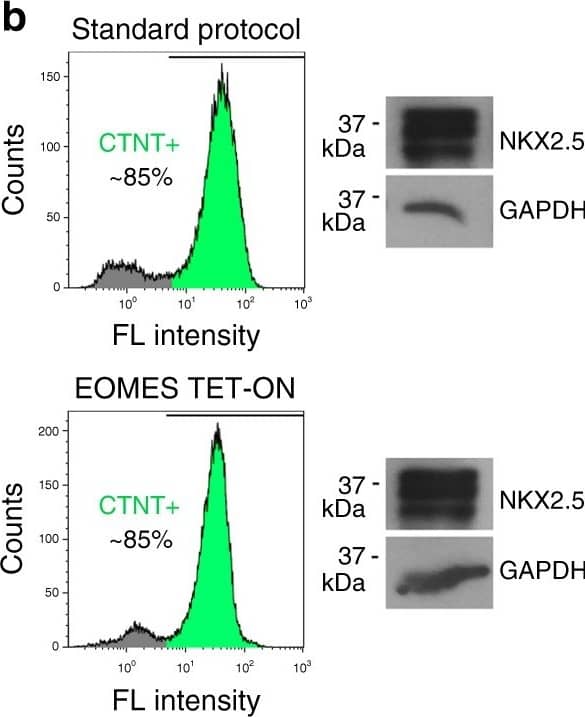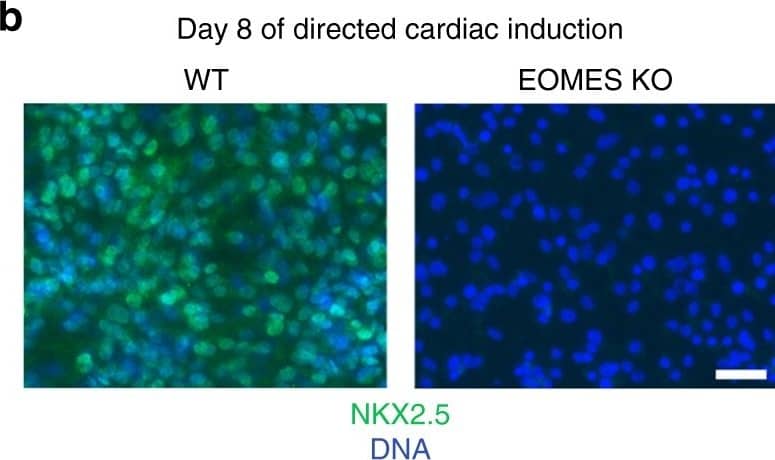Human NKX2.5 Antibody
R&D Systems, part of Bio-Techne | Catalog # AF2444


Key Product Details
Validated by
Knockout/Knockdown
Species Reactivity
Validated:
Human
Cited:
Human, Mouse
Applications
Validated:
Immunohistochemistry, Western Blot
Cited:
Immunocytochemistry, Immunohistochemistry, Immunohistochemistry-Frozen, Immunohistochemistry-Paraffin, RNA immunoprecipitation
Label
Unconjugated
Antibody Source
Polyclonal Goat IgG
Product Specifications
Immunogen
E. coli-derived recombinant human NKX2.5
Gln24-Arg137
Accession # P52952
Gln24-Arg137
Accession # P52952
Specificity
Detects human NKX2.5 in direct ELISAs and Western blots.
Clonality
Polyclonal
Host
Goat
Isotype
IgG
Scientific Data Images for Human NKX2.5 Antibody
Detection of Human NKX2.5 by Western Blot
EOMES programs hESCs into functional CMs at high efficiency. a Illustration of growth factor-mediated and optimized EOMES induction-based cardiac differentiation protocols. Bottom right: Immunoblot validating doxycycline-dependent EOMES expression in a transgenic EOMESKO/E.TET-ON hESC line. b Typical yields of hESC-CMs (left, flow cytometry) and NKX2.5 expression (right, immunoblot) obtained with the two protocols (day 10). c Immunostainings 21 days after the initiation of EOMES induction. Weak perinuclear ANP staining is typical in overall MLC2v-positive hESC-CMs. Scale bars: 25 (top) and 50 µm (bottom). d Acceleration and slowdown of spontaneous beat rates in pCMs following exposure to 10 µM isoprenaline and 10 µM propranolol, respectively, on multielectrode arrays. e Microarray-based time course analysis comparing the indicated protocols and cell lines. RESCUE cells carry an inducible EOMES transgene on EOMESKO HuES6 background. Underlying data are from Supplementary Data 2 Image collected and cropped by CiteAb from the following publication (https://pubmed.ncbi.nlm.nih.gov/29382828), licensed under a CC-BY license. Not internally tested by R&D Systems.Detection of Human NKX2.5 by Immunocytochemistry/Immunofluorescence
Contextual requirements of EOMES-mediated CM programming. a DOX dose dependency of the EOMES TET-ON protocol using the WTE.TET-ON hESC line. Top panel: Immunostains at 1.5 wk. Scale bar: 100 µm. Bottom: Flow cytometry analysis. Numbers indicate average percentages of cTnT-positive CMs from 3–6 experiments per condition. b CM programming by EOMES necessitates suppression of autocrine WNT signaling from the third day of transgene induction (qPCR data, n = 2). c DOX dose-dependent CM programming using an independent WTE.TET-ON hiPSC line. The data shows immunostaining (scale bar: 100 µm), RT-qPCR (n = 4), and FACS analysis (n = 3) performed at 1 wk of differentiation. The asymmetrical shape of the DOX titration data with this line is in part due to the incomplete repression of SOX2 at 0.05 µg/ml, which caused overgrowth of the cultures with neural precursors (also see Supplementary Fig. 3f). Error bars: s.e.m. Image collected and cropped by CiteAb from the following publication (https://pubmed.ncbi.nlm.nih.gov/29382828), licensed under a CC-BY license. Not internally tested by R&D Systems.Detection of Human NKX2.5 by Immunocytochemistry/Immunofluorescence
EOMES knockout hESCs fail to differentiate into cardiomyocytes. a Immunoblot confirming EOMES expression and its absence in WT and KO cells, respectively, at the cardiac mesoderm stage of directed differentiation. b EOMES KO cells fail to express the early cardiomyocyte marker NKX2.5 following exposure to a directed differentiation protocol. Scale bar: 50 µm. c EOMES KO cells show a general failure in markedly upregulating essential pan-cardiac genes (qPCR data, n = 3; error bars: s.e.m.). For each gene, the expression level in the highest expressing sample (“max” = WT in all three cases) is set to 1. d Differentiation of EOMES KO hESCs under signaling factor-assisted, non-cardiac mesoderm/endoderm-permissive culture conditions. Top: EOMES KO cells fail to express alpha-fetoprotein following Activin A-assisted endodermal induction. Scale bar: 50 µm. Bottom: Non-cardiac mesodermal differentiation competence of EOMES KO hESCs. KO cells were differentiated using varied meso and endoderm-permissive induction conditions. The data denote transformed p-values of annotation terms enriched in gene sets upregulated in EOMES KO samples compared to undifferentiated hESCs or differentiated WT controls (cutoffs: 10 or 3-fold, respectively). Underlying data: Supplementary Data 1 Image collected and cropped by CiteAb from the following publication (https://pubmed.ncbi.nlm.nih.gov/29382828), licensed under a CC-BY license. Not internally tested by R&D Systems.Applications for Human NKX2.5 Antibody
Application
Recommended Usage
Immunohistochemistry
5-15 µg/mL
Sample: Immersion fixed paraffin-embedded sections of human heart
Sample: Immersion fixed paraffin-embedded sections of human heart
Western Blot
0.1 µg/mL
Sample: Recombinant Human NKX2.5
Sample: Recombinant Human NKX2.5
Reviewed Applications
Read 2 reviews rated 4 using AF2444 in the following applications:
Formulation, Preparation, and Storage
Purification
Antigen Affinity-purified
Reconstitution
Reconstitute at 0.2 mg/mL in sterile PBS. For liquid material, refer to CoA for concentration.
Formulation
Lyophilized from a 0.2 μm filtered solution in PBS with Trehalose. *Small pack size (SP) is supplied either lyophilized or as a 0.2 µm filtered solution in PBS.
Shipping
Lyophilized product is shipped at ambient temperature. Liquid small pack size (-SP) is shipped with polar packs. Upon receipt, store immediately at the temperature recommended below.
Stability & Storage
Use a manual defrost freezer and avoid repeated freeze-thaw cycles.
- 12 months from date of receipt, -20 to -70 °C as supplied.
- 1 month, 2 to 8 °C under sterile conditions after reconstitution.
- 6 months, -20 to -70 °C under sterile conditions after reconstitution.
Background: NKX2.5
Long Name
NK2 Homeobox 5
Alternate Names
CSX1, NKX2-5, NKX2E
Entrez Gene IDs
1482 (Human)
Gene Symbol
NKX2-5
UniProt
Additional NKX2.5 Products
Product Documents for Human NKX2.5 Antibody
Product Specific Notices for Human NKX2.5 Antibody
For research use only
